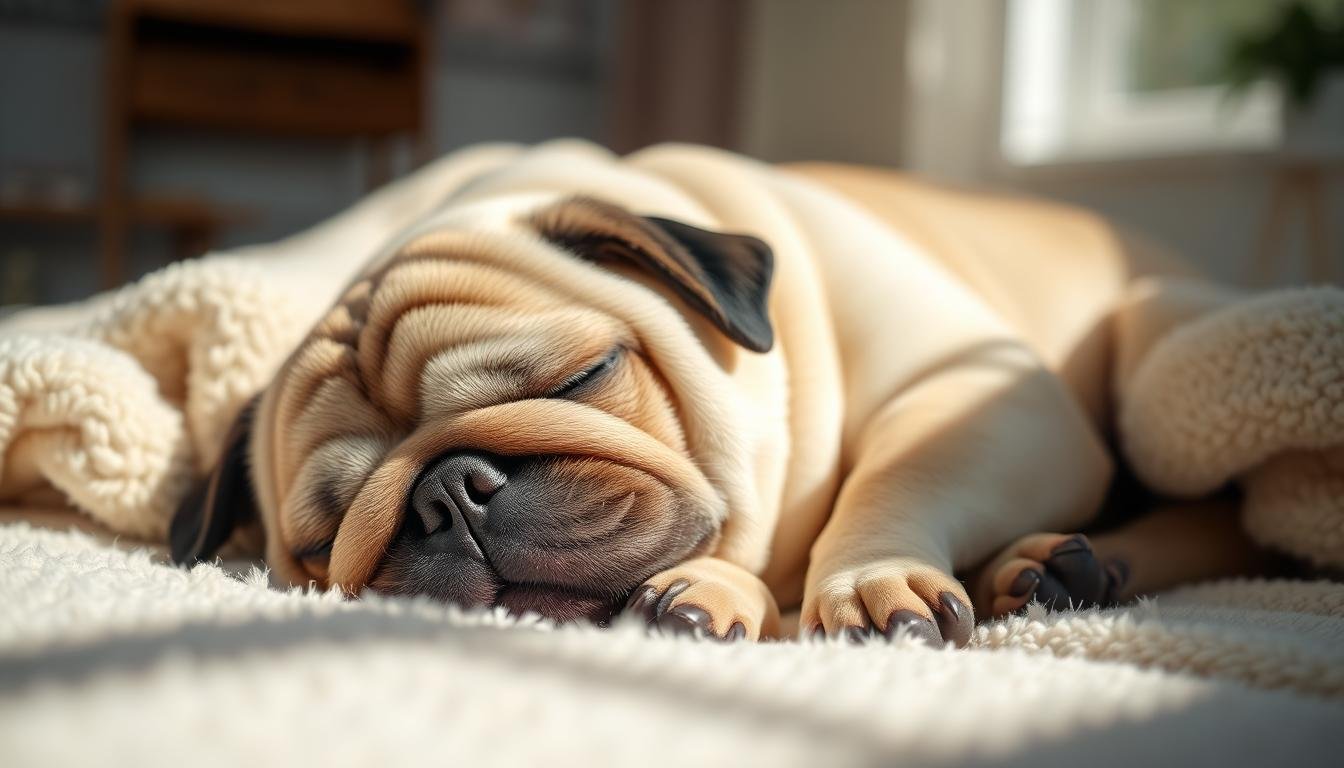How to avoid disrupting your Pug’s sleep schedule
Pugs love to sleep, often resting for up to 14 hours a day. Disruptions can make them irritable and lethargic. This article offers tips to keep your Pug’s sleep schedule consistent.
Learn how to understand their sleep needs and create a cozy sleeping area. You’ll discover how to ensure your Pug gets the rest they need.
Understanding a Pug’s Sleep Needs
Pugs have a special face shape with flat faces and short snouts. This shape affects their energy and sleep. They need more rest because they can’t handle much activity.
The Role of a Pug’s Brachycephalic Anatomy
Pugs face sleep challenges because of their face shape. They sleep about 14 hours a day. Their faces can cause sleep apnea, making them tired during the day.
Pug Energy Bursts and Their Impact on Sleep
Pugs can suddenly become very active. This is good for them, letting them use some energy before sleeping again. Pug puppies sleep less than grown Pugs, taking short naps to rest.
An adult Pug sleeps 12 to 14 hours a day. Puppies sleep 18 to 20 hours a day to grow fast. Older Pugs might sleep more because of joint pain or tiredness.
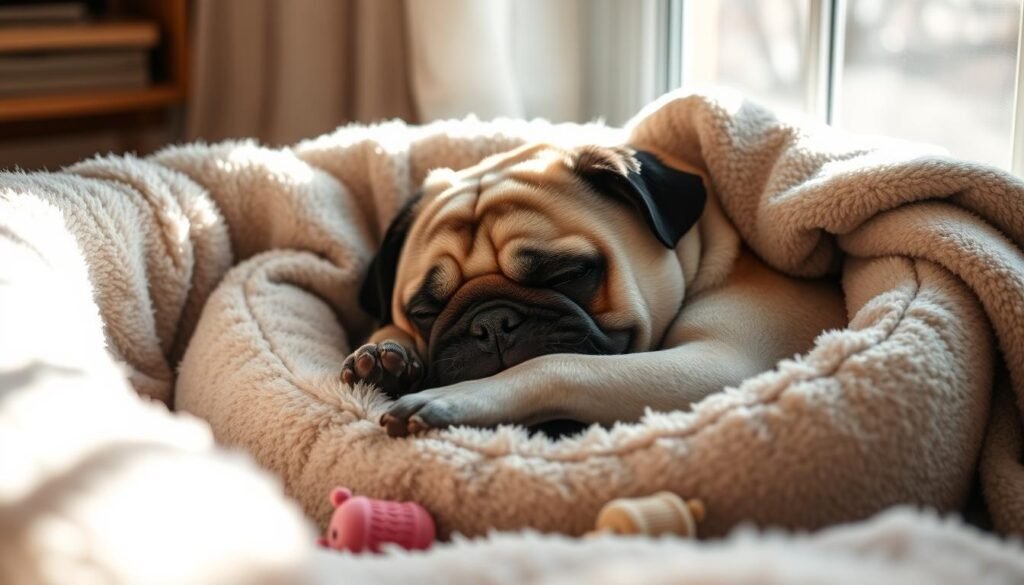
“Pugs are most active early in the morning after sunrise and may take shorter naps throughout the day to recharge their energy.”
Things like age, how active they are, health, sleep place, and food affect a Pug’s sleep. Knowing how much sleep a Pug needs is key to keeping them healthy.
Establish a Consistent Sleep Routine
Creating a consistent sleep routine is key for your Pug’s quality rest. A predictable schedule helps your Pug know when it’s time to sleep. This reduces sleep schedule disruptions.
Begin by setting a regular bedtime for your Pug. Dogs do well with routine. Also, feed them at the same times each day. A full stomach helps them sleep better.
Make sure your Pug gets daily exercise. Physical and mental activity improves sleep quality.
- Establish a consistent bedtime for your Pug
- Maintain a regular feeding schedule
- Incorporate daily exercise into your Pug’s routine
By setting a Pug sleep routine and sticking to it, your Pug will rest better. Remember, every Pug is different. Be ready to adjust your routine to fit your Pug’s needs.
“A well-rested Pug is a content Pug.”
Create a Cozy Sleeping Environment
It’s key to give your Pug a comfy sleep spot for good rest. The right bedding and a quiet, cool place are crucial. These things can really help your Pug sleep better.
Choose the Right Bedding
Pugs like certain bedding that helps them sleep well. Look for orthopedic mattresses or soft blankets. They support their body and make sleeping easier. Also, raised beds help keep them cool by improving air flow.
Maintain Optimal Temperature and Noise Levels
The room’s temperature and quietness are important for your Pug’s sleep. Keep it cool, around 65-75°F, to stop them from getting too hot. Make sure it’s quiet, with no loud noises or other pets disturbing them. A white noise machine or fan can help make it quieter and more relaxing.
Creating a cozy sleep area for your Pug can make them happy and healthy. A well-rested Pug is a happy Pug!
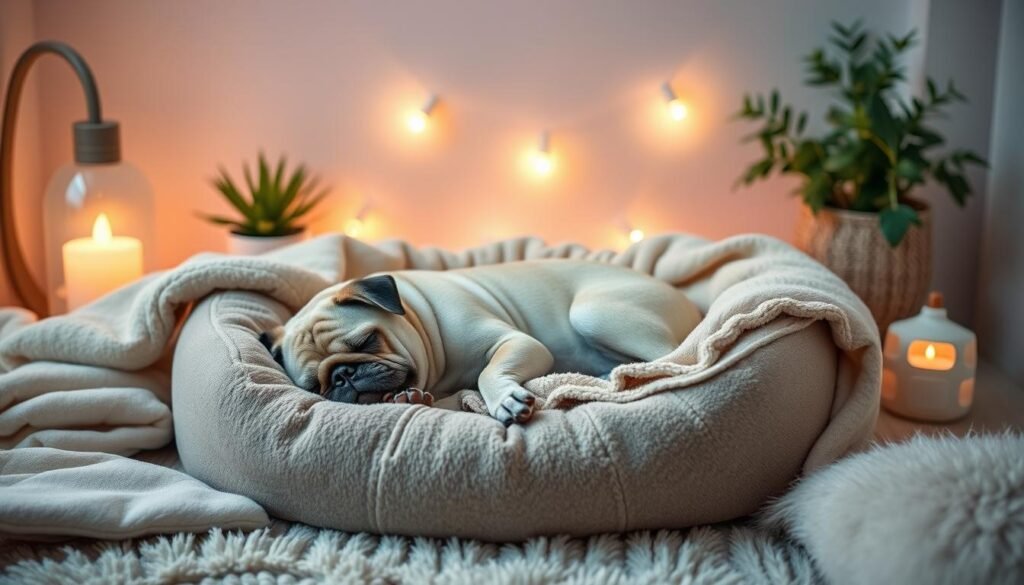
“A dog’s sleep is just as important as a human’s. With the right sleeping conditions, your Pug can get the rest they need to thrive.”
How to Avoid Disrupting Your Pug’s Sleep Schedule
Keeping your Pug’s sleep schedule regular is key for their health. Be careful of things that might wake them up, like loud noises or bright lights. Also, avoid sudden changes in their routine.
Creating a consistent bedtime routine is a great tip. Pugs like knowing what to expect, so try to put them to bed at the same time every night. This helps them sleep better and stay healthy.
- Avoid letting your Pug drink water close to bedtime to prevent midnight bathroom trips.
- Don’t exercise your Pug too much before bed. It can make them need to go out in the middle of the night.
- Try using natural sleep aids like melatonin to help your Pug relax and sleep better.
It’s also important to keep your own sleep schedule regular. A consistent bedtime routine helps your Pug adjust to their sleep patterns. This makes for a quieter and more restful night for both of you.
“Consistency in the pet owner’s sleep schedule is emphasized as it can impact the dog’s sleep habits, with the suggestion that maintaining a regular bedtime is less confusing for the dog than varying bedtime routines.”
By following these tips, you can help your Pug sleep better. A well-rested Pug is a happy and healthy one!
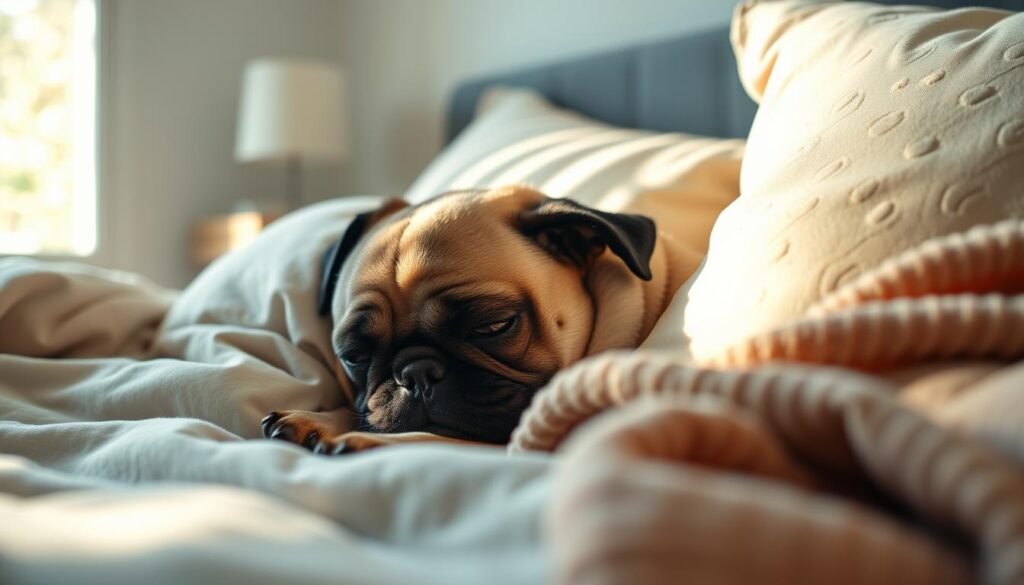
The Importance of Daily Exercise
Keeping your Pug healthy and happy means regular exercise. This helps them sleep better at night. By giving them both physical and mental challenges, they’ll be ready for a good night’s sleep.
Physical and Mental Stimulation
There are many ways to keep your Pug active. Playtime, walks, and puzzle toys are great. These activities keep their body and mind sharp, making for a balanced routine.
- Play interactive games like fetch or tug-of-war to keep them active and thinking.
- Take them on walks that match their age and energy level.
- Use puzzle toys to challenge their problem-solving skills.
Combining physical and mental exercises tires out your Pug. This makes them ready for a peaceful night’s sleep.
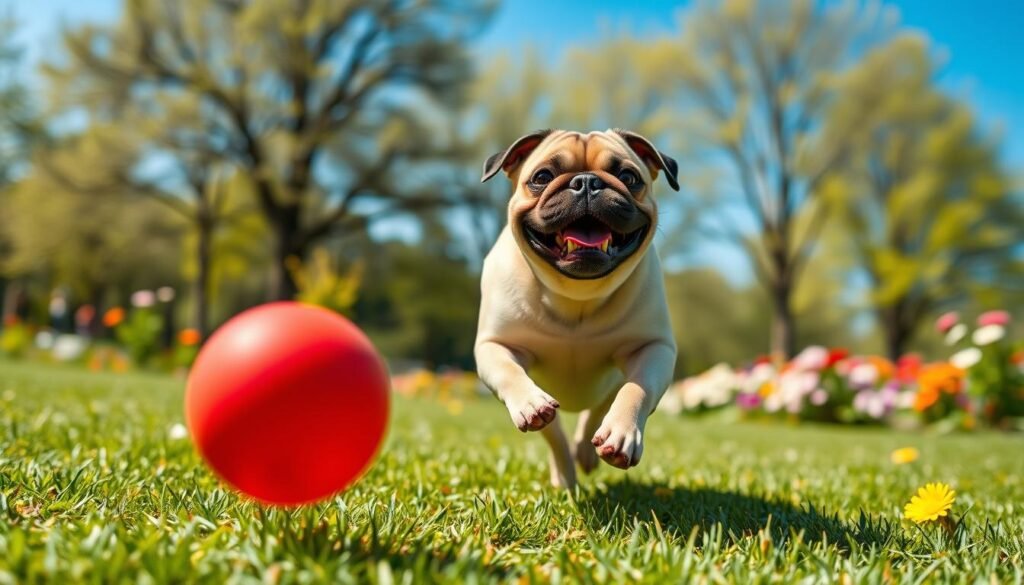
“A tired Pug is a happy Pug. Regular exercise not only keeps your furry friend physically fit but also helps promote a good night’s sleep.”
Manage Anxiety and Stress
Anxiety and stress can really mess with a Pug’s sleep. Things like being left alone, loud noises, or changes in their environment can upset them. Using calming methods can help your Pug relax and sleep better.
Calming Techniques for Anxious Pugs
Playing soothing music or using aromatherapy can calm your Pug. Lavender or chamomile can make them feel more relaxed. You can also try supplements with L-theanine to reduce stress and help them relax.
Keeping a regular sleep schedule is also key. Make sure their bedtime is consistent and their sleeping area is cozy. Avoid sudden changes to help manage their anxiety and promote better sleep.
“Anxiety in dogs can be triggered by a variety of factors, from loud noises to major life changes. Understanding the root causes and implementing calming strategies is key to helping your Pug get the restful sleep they need.”
If your Pug’s anxiety doesn’t get better, talk to your vet. They can suggest more calming techniques or prescribe medication if needed. This will help your Pug sleep well.
Address Potential Health Issues
Health problems can mess up your Pug’s sleep. Pain, discomfort, or illness can make it hard for them to sleep well. If your Pug seems tired, grumpy, or eats less, see a vet.
Pugs might face sleep issues more often because of their face shape. Sleep apnea, which stops breathing during sleep, is common in them. Catching sleep problems early and getting vet help is key.
Your vet will check your Pug and suggest treatments. This could be managing health issues or giving medicines to help them sleep better. They might also suggest CBD oil for calmness and better sleep. It’s important to watch how your Pug reacts to CBD.
Fixing health issues that affect sleep is vital for your Pug’s health. With your vet’s help, your Pug can get the rest they need to be happy and healthy.
Pug Sleep Cycles and Napping
Pugs sleep in a special way, balancing long nights with short naps during the day. They wake up early, around sunrise, eager to begin their day. They take short naps to recharge and feel refreshed.
The Art of Pug Napping
Pugs know how to nap in the cutest ways. They curl up in cozy spots or stretch out in the sun. Knowing when your Pug needs a nap helps you meet their needs and ensure they rest well.
Whether they sleep all night or take a nap in the afternoon, Pugs are experts at resting. A quiet, comfy place helps your Pug sleep better. This keeps them happy, healthy, and well-rested.

